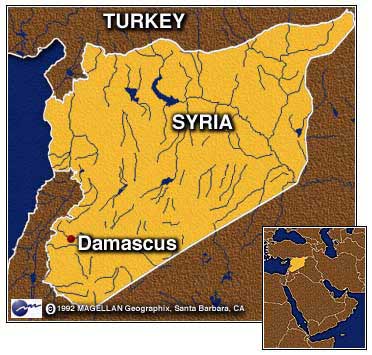by Ian Williams
One thing sure about the parlous situation in Syria is that in their religious o btusity none of the Republican candidates have anything coherent or useful to sa y about it. But to be fair, Pharisaical hypocrisy is the dominant global mode fo r Syria. While we can, and indeed we should, deplore the Russian and Chinese vet oes of the United Nations Security Council resolution on Syria that they had alr eady negotiated down to platitudinous inefficacy, the United States condemnation of Russia comes strangely from the record holder for UN vetoes, most recently o f a resolution expressing the President’s own declared position on Palestine. And if President Bashar al-Assad’s half-life is as short as it looks at the moment , Moscow committed not just a crime, but a spectacular long-term financial and d iplomatic blunder. Among the few to emerge with redibility have been the UN Secretary General Ban Ki Moon and the High Commissioner for Human Rights Navi Pillay who were prepared t o condemn the Ba’athist violence against their own people, just as they have condem ned sraeli behaviour against Palestinians. In that context, after the veto in the Security Council, and Pillay’s Human Rights Council report, the Americans supporte d a procedural innovation: an immediate UN General Assembly resolution reiterati ng the points in the vetoed Security Council attempt. However, the support was undercut with constant references to the “non-binding” nature of General Assembly reso lutions. This is an oblique homage to the Palestinian habit of taking Security Council res olutions vetoed by Washington to the General Assembly under the “Uniting for Peace” p rocedure that the US had pioneered during the Korean War in order to by-pass Mos cow’s veto. Hypocrisy often disappears up its rectum like that. Similarly pushing for the Assembly resolution are Saudi Arabia and Bahrain, each with their own culturally specific ways of dealing with unarmed protestors, not to forget Morocco, 40 years into its illegal occupation of Western Sahara. Perh aps most outstandingly Sudan, whose president is under indictment by the Interna tional Criminal Court over Darfur, still voted for the resolution. It is Assad’s proximity to Iran that impels the sundry oil-kings into common ground with the pro-Israel neo-conservatives and, almost mind-bogglingly, al Qaida. Su ch a rogues’ gallery lined up against him is almost enough to make you suspect Ass ad of hidden virtues until you look at the admirers of Slobodan Milosevic, Sadda m Hussein and Muammar Gaddafi lionising him. Taking their cue from Moscow, opponents of international so complain that insurgents are now fighting back, as if quivalence between heavily-armed professional forces and and rebels who only took up arms after year of one-sided action against Assad al there were some moral e a handful of deserters repression.
George Orwell famously said: “There is hardly such a thing as a war in which it ma kes no difference who wins. Nearly always one side stands more of less for progre ss, the other side more or less for reaction.” In the complex web of parties involve d in and around Syria, Assad clearly represents reaction. However, it could be h ard to unequivocally categorise all the insurgents as on the side of progress. But for progress, Assad surely has to go – and soon. The longer he lingers, the mo re danger there is that Syria slides into a sectarian mess. So far, no one has s uggested a referral to the International Criminal Court, which would have sent a message to the regime and its supporters. On the other hand, that offers an esc ape route. One could almost foresee a palace in the Gulf in the Assad family fut ure. In any case, the international community needs to offer protection to the Alawit es and other minorities against the risk of pogroms and to supervise a transitio n to an elected government. At least the US and the West realise that it can’t be them, but Moscow and Beijing still have an opportunity to become part of the sol ution instead of perpetuating the problem. A public withdrawal of support might persuade the regime that it was time to stop the shooting. In the end, the UN Security Council, for all its faults, is the only body that c ould legitimately direct whatever belated peacekeeping process comes together.
scribd, 25/2/2012

Laisser un commentaire